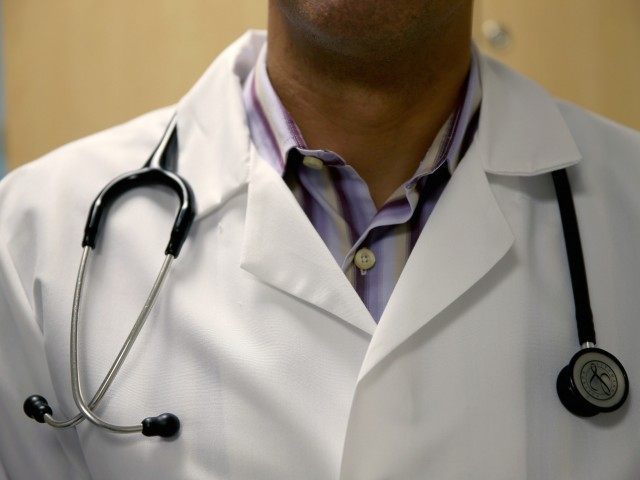America faces a deep shortage of doctors as Obamacare is implemented. That is the view shared by 100 health care professionals who gathered at the 33rd annual meeting of Doctors for Disaster Preparedness in Ontario, California over the weekend. They forecast a future of decreased quality of health care and access to doctors if current policies continue.
“What do I mean by medical meltdown? Well, sadly ,I’m here to tell you that the medical care you’ve enjoyed in the past in your life is simply not going to be there in the future,” said orthopedic surgeon Dr. Lee Hieb, who addressed the conference.
Just like a black hole is so dense that no light gets out, “We have so much regulation that almost no medical care gets out,” Hieb told the audience. “We have over 160,000 pages of Medicare regulation and counting.” She continued, “Obamacare is Medicare on steroids.”
“The reason we have a shortage of doctors today and we’re going to get worse in the future began in the early 70s because the great gurus of government looked around and they said probably…look at all this money that’s being sent to all these specialists.” Hieb went on to say that government bureaucrats decided to limit the number of specialists.
However, Lieb notes, that the U.S. is only seeing 350 new general surgeons a year. That is not even a replacement rate, she observed.
Hieb professed that being taxed to death and having to send so much money to the government is a disincentive for doctors to work at full capacity.
“Our young people are not trained as well as we were,” she continued.
“We are now the number one profession for suicide. We lose 400 doctors a year to suicide. That’s like losing an entire medical school,” Hieb stated.
Hieb also cited a shortage of “things” or medical supplies–the first she has seen in her 40 years of involvement in medicine. She recalled almost having to close an operating room for shortages of propofols, which are used to put people to sleep; as well as shortages of tetanus vaccine, shoulder catheters and thyroid medication shortages, among other items.
The cause, according to Hieb, is “this huge over-regulatory environment.”
She elaborated on the thyroid example, saying,
These are old medicines that have lost their patent and they’ve been produced without a problem in these factories for years, but the government rolls in and says you have to bring this factory up to some arbitrary new standard and these guys say, well, we can’t do that because–guess what? you guys price fixed. You tell us what you’re going to pay, Medicare’s going to pay for this stuff. We can bill anything we want to, we get paid what you tell us you get paid, and now you’re telling us we have to spend all this money to modernize our factories. We’re going to lose money, we can’t do that, so we’re going to shut down. So after a few factories shut down in one of these nationwide shortages in classic bureaucratic fashion, the government says well wait a minute, wait a minute, you can’t shut down.
You said, “what, what do you mean we can’t shut down?”
[They say] Well, okay, I guess you can shut down, but you’re going to have to give us six months notice.
They just don’t get it.
She pointed the audience to Venezuela as a picture of the “end game.”
Hieb cited a story written by Dr. Richard Amerling and published in the Wall Street Journal (and summarized in Newsmax) that documented the plight of Pedro Gonzalez. Gonzalez, Amerling wrote, checked into a leading Venezuelan public hospital for life saving heart valve surgery. About two months later, all of the cardiac ward patients were discharged due to lack of operating room supplies according to a letter issued. Gonzalez collapsed and died a week later.
“The free market doesn’t come up with shortages this way, but we are starting to see it,” Hieb said. “If you live in a very affluent area and you’re privately insured and your neighbors are privately insured, you will probably not…won’t see it as quickly as other places.”
Hieb referenced work in an Arizona area where 85% of payers were government-paid through Medicare, Medicaid and Tricare. Four orthopedic surgeons would do the work that 10, 11 or 12 in more affluent Flagstaff would take on. She said the average orthopedic surgeon in America takes care of 12,000 people. Conversely, the region where Hieb worked was serving approximately 90,000, which later ballooned to 120,000 as Hieb left and only three surgeons remained. She said her 53-year-old former colleague from the region died thereafter under the long and strenuous work.
“The big black hole is already starting to open up,” Hieb said.
She mentioned traveling two hours to reach an obstetrician, waiting six hours to be seen by an orthopedic surgeon, or three or four months to see a rheumatologist as problems facing those in less affluent regions.
“In a free market, when there’s a shortage, it gets filled,” Hieb said.
Hieb then launched into health recommendations for “how to save yourself.” She said going into the future, “you want to be so healthy that you don’t need a doctor” in light of the impending medical shortages which she had detailed.
Dr. Hieb is listed in the Doctors for Disaster Preparedness program as “an orthopedic surgeon specializing in spine surgery and a past president of the Assn. of American Physicians and Surgeons.”
Follow Michelle Moons on Twitter @MichelleDiana

COMMENTS
Please let us know if you're having issues with commenting.